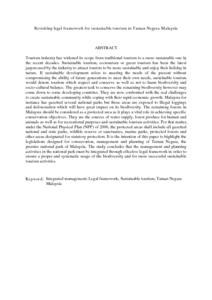Citation
Md Khalid, Rasyikah and Sulaiman, Siti Sarah and Abu Bakar, Noraziah and Ab Rahman, Suhaimi
(2013)
Revisiting legal framework for sustainable tourism in Taman Negara Malaysia.
Research Journal of Applied Sciences, 8 (8).
pp. 393-397.
ISSN 1815-932X; ESSN: 1993-6079
Abstract
Tourism industry has widened its scope from traditional tourism to a more sustainable one in the recent decades. Sustainable tourism, ecotourism or green tourism has been the latest jargon used by the industry to attract tourists to be more sustainable and enjoy their holiday in nature. If sustainable development refers to meeting the needs of the present without compromising the ability of future generations to meet their own needs, sustainable tourism would denote tourism which respect and conserve as well as not to harm biodiversity and socio-cultural balance. The greatest task to conserve the remaining biodiversity however may come down to some developing countries. They are now confronted with the real challenges to create sustainable community while coping with their rapid economic growth. Malaysia for instance has gazetted several national parks but those areas are exposed to illegal loggings and deforestation which will have great impact on its biodiversity. The remaining forests in Malaysia should be considered as a protected area as it plays a vital role in achieving specific conservation objectives. They are the sources of water supply, forest produce for human and animals as well as for recreational purposes and sustainable tourism activities. For that matter, under the National Physical Plan (NPP) of 2006, the protected areas shall include all gazetted national and state parks, wildlife reserve or sanctuaries, marine parks, protected forests and other areas designated for statutory protection. It is the intention of this paper to highlight the legislations designed for conservation, management and planning of Taman Negara, the premier national park of Malaysia. The study concludes that the management and planning activities in the national park must be integrated through effective legal framework in order to ensure a proper and systematic usage of the biodiversity and for more successful sustainable tourism activities.
Download File
![[img]](http://psasir.upm.edu.my/28382/1.hassmallThumbnailVersion/Revisiting%20legal%20framework%20for%20sustainable%20tourism%20in%20Taman%20Negara%20Malaysia.pdf)  Preview |
|
PDF (Abstract)
Revisiting legal framework for sustainable tourism in Taman Negara Malaysia.pdf
Download (84kB)
| Preview
|
|
Additional Metadata
Actions (login required)
 |
View Item |

